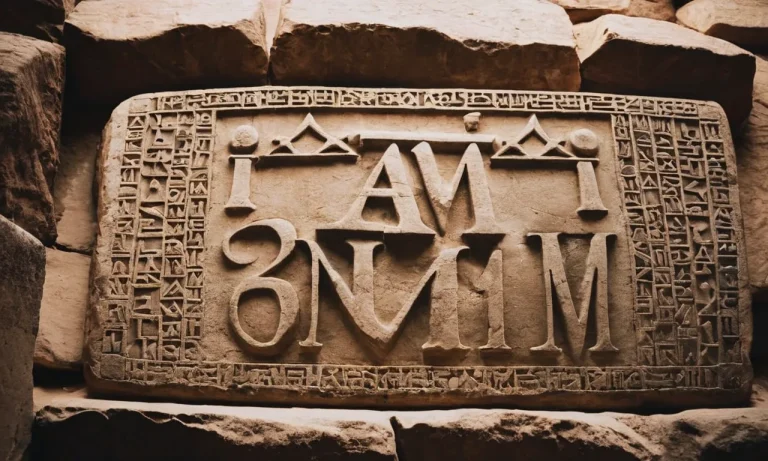Why Did God Reject Saul?
Saul was the first king of Israel, chosen and anointed by God through the prophet Samuel. Yet over time, Saul disobeyed God’s commands and was subsequently rejected by God as king. If you’re short on time, here’s a quick answer to why God rejected Saul: God rejected Saul as king because Saul repeatedly disobeyed God’s commands and instructions.
Saul’s Anointing as King
Saul Chosen to Lead Israel
Saul was anointed as the first king of Israel in around 1050 BC. At that time, Israel was a loose confederation of 12 tribes with no central government. The people pleaded with Samuel, the prophet and judge, to appoint a king to unite and lead them like other nations.
Though hesitant at first, God told Samuel to listen to the people and anoint Saul as their king. Samuel privately anointed Saul, signifying he was chosen by God to rule (1 Samuel 10:1). Publicly, Saul was selected through a process of elimination and confirmed by lot (1 Samuel 10:17-24).
God’s spirit empowered Saul, giving him the leadership abilities and courage needed to carry out his new responsibilities (1 Samuel 10:6-7, 9-10).
Though Saul stood head and shoulders above others physically, he came from a humble background from the smallest tribe of Benjamin (1 Samuel 9:21). God often chooses the weak to lead so that His power is shown through them.
Saul’s anointing represents God’s mercy in response to Israel’s plea for a king. However, there were indications from the outset that Saul’s heart was not fully devoted to God.
God’s Spirit Upon Saul
When Samuel anointed Saul, God’s Spirit came upon him powerfully, giving him supernatural signs and the ability to prophesy (1 Samuel 10:6, 10). This showed Saul was God’s chosen king and equipped him to lead Israel as God’s representative.
The Spirit would enable Saul to have wisdom, courage, capability and charisma beyond his natural abilities. However, Saul did not always walk in step with God’s Spirit. Though he began humbly, Saul eventually became prideful and jealous of David’s popularity.
The Holy Spirit empowers believers today with spiritual gifts and abilities to accomplish God’s work (1 Corinthians 12:4-11). However, we must stay sensitive and submitted to Him. Pride was Saul’s downfall. Rather than boasting in his abilities, he should have remained humble and dependent on God.
As believers, we must remember that any giftings and callings come from God by His grace. Walking in step with the Spirit must be our daily priority.
Though not perfect, Saul’s 40-year reign did lead to some military victories and united the 12 tribes. However, Saul repeatedly disobeyed God, finally leading to his rejection. After warning Saul through Samuel, God allowed David to be anointed king in his place.
Nevertheless, God used Saul’s reign to transition Israel from tribal government to centralized monarchy.
Saul’s Disobedience at Gilgal
Instructions to Wait for Samuel
After Saul was anointed as the first king of Israel, he faced his first major test shortly after taking the throne. The Philistines had gathered a massive army and were preparing to attack Israel. Saul and his men were greatly outnumbered.
The prophet Samuel had instructed Saul to go to Gilgal and wait seven days for him to arrive and make an offering to the Lord before going into battle. This was a test of Saul’s obedience. Samuel told Saul that after he arrived, he would offer sacrifices to seek the Lord’s favor and then Samuel would give Saul further instructions.
However, as the seventh day was ending, Samuel still had not arrived. Saul was growing anxious as the Philistine threat loomed larger. His men were deserting out of fear. Feeling pressure, Saul decided to take matters into his own hands instead of waiting for Samuel.
Though he was not a priest and this was a clear overstepping of his bounds as king, Saul offered the burnt offering himself to the Lord, directly disobeying Samuel’s instructions.
Saul Offers Unauthorized Sacrifice
Right after Saul offered the unauthorized sacrifice, Samuel arrived. Saul, realizing his disobedience, went out to greet Samuel enthusiastically. However, Samuel confronted Saul, asking “What have you done?”
Saul defended himself by saying he saw his men deserting and the Philistines gathering, and since Samuel had not arrived by the appointed time, he took it upon himself to offer the sacrifice. Samuel responded with strong words, telling Saul “You have done foolishly.
You have not kept the command the Lord your God gave you.” Samuel explained that God was testing Saul’s commitment to fully obey His instructions. By taking matters into his own hands, Saul had failed the test. As a result, Samuel told Saul that his kingdom would not endure.
Saul’s dynasty would be taken away and given to another who was obedient to God’s commands.
Though Saul tried to rationalize his disobedience, he was clearly wrong in not waiting for Samuel to offer the authorized sacrifice, as he had been instructed. Saul allowed fear of the Philistine threat to drive him to operate outside of his authority.
This was an act of direct rebellion against God’s command given through Samuel. Saul’s kingdom got off to a disastrous start because he relied on his own wisdom rather than fully obeying God’s instructions.
This was a mistake Saul would repeat throughout his reign, eventually causing God to reject him as king.
Saul’s Disobedience in Battle Against the Amalekites
God’s Orders to Destroy Amalek
After the Israelites were freed from slavery in Egypt and settled in the promised land, God ordered King Saul through the prophet Samuel to completely destroy the Amalekites – their people, animals, and possessions.
God wanted to judge the Amalekites for attacking the defenseless Israelites when they came out of Egypt (1 Samuel 15:2-3). This was a divine judgment on an evil, idolatrous people who had defiantly opposed God’s people.
However, Saul disobeyed God’s direct orders. Although Saul’s army defeated the Amalekites, they spared King Agag’s life and kept the best sheep, cattle, and valuables. Saul justified his actions by claiming the animals would be sacrificed to God, but God was not pleased with Saul’s incomplete obedience.
God had commanded everything and everyone connected to Amalek to be destroyed.
Saul Spares Lives and Property
When Samuel confronted Saul, he admitted he had sinned by not fully carrying out God’s instructions. Saul insisted the soldiers kept the animals to sacrifice to God, but Samuel declared obedience is better than sacrifice. Despite Saul’s excuses, his key mistakes were:
- Not destroying all the Amalekites as God commanded, allowing King Agag to live
- Keeping the best livestock and valuables instead of destroying everything
- Disobeying God’s direct orders and instructions
Samuel explained that rebellion and arrogance were as evil as witchcraft and idolatry (1 Samuel 15:23). By not obeying God 100%, Saul had chosen his own will over God’s will. As a result, God rejected Saul from continuing as king over Israel (1 Samuel 15:26).
Saul’s failure to fully obey God offers a sobering lesson for believers today. God requires our complete obedience in following His instructions and commands as revealed in Scripture. We must not justify partial obedience or excuse our own actions when they clearly contradict God’s Word.
The Lord searches our hearts and knows our real motivations (1 Samuel 16:7).
Just as God removed Saul from leadership for his prideful disobedience, believers today must humbly choose to follow the Lord’s directions completely. We honor God by surrendering our will to His perfect will as made known in the Bible.
As Samuel said, “To obey is better than sacrifice” (1 Samuel 15:22).
Consequences of Saul’s Disobedience
Samuel Confronts and Rebukes Saul
After Saul’s disobedience regarding the Amalekites, the prophet Samuel confronted Saul. He told Saul that because of his rebellion, God had rejected him as king over Israel (1 Samuel 15:23). Samuel also delivered the message that God regretted making Saul king in the first place due to his disobedience (1 Samuel 15:11).
This was a huge blow to Saul. Samuel emphasized that obedience was better than sacrifice. God values obedience to His commands over the offerings we bring Him (1 Samuel 15:22).
God Rejects Saul as King
Due to Saul’s pride and disobedience, God rejected him as king over Israel. God was grieved that He had made Saul king (1 Samuel 15:11). Even though Saul continued to reign for many more years, the tearing of his kingdom away from him had been set in motion.
The consequences of Saul’s disobedience were far-reaching. From this point on, God’s favor lifted from Saul and his decline began as David rose to prominence.
The Lord would take the kingdom out of Saul’s hand and give it to another more worthy, someone who listened to God’s voice and had a heart after Him (1 Samuel 15:28). That man was David. Sadly, Saul’s legacy as the first king over Israel was forever tarnished.
Saul’s Decline and Torment
After God rejected Saul as king, Saul began to steadily decline while David rose. Saul was tormented by an evil spirit (1 Samuel 16:14) and he began to suffer bouts of depression, fear and paranoia especially where David was concerned. Saul made multiple attempts on David’s life.
He became obsessed with trying to kill the very man God had chosen to replace him as king.
In one incident, Saul even visited a medium to conjure up the spirit of Samuel, hoping the prophet could help him defeat the Philistines in battle (1 Samuel 28:7-20). Saul had previously driven mediums and spiritists out of the land, but now in desperation disobeyed God’s commands once again.
Despite his anointing, prominent position, good looks and promising start, Saul’s life and reign devolved into disaster and tragedy. From the first God-appointed king of Israel, he became an example of disobedience and a life wrecked by lack of trust in God.
Lessons from Saul’s Downfall
Obedience Better Than Sacrifice
Saul was appointed as the first king of Israel, but he failed to be faithful and obedient to God. Though Saul tried to please God by offering sacrifices, his disobedience showed that he valued religious rituals over true obedience.
As Samuel told Saul, “To obey is better than sacrifice” (1 Samuel 15:22). This remains an important lesson for us today – God cares more about our heartfelt obedience than external shows of religion.
Pride Goes Before Destruction
Another flaw that led to Saul’s downfall was his pride. When Saul first became king, he was humble. But over time, he became arrogant and self-centered. For example, Saul built a monument to himself even though God deserved the glory for giving Israel victory in battle (1 Samuel 15:12).
And when Samuel rebuked Saul, he refused to admit his sin. As Proverbs 16:18 warns, “Pride goes before destruction, a haughty spirit before a fall.” Saul’s pride prevented him from repenting, and ultimately led to God rejecting him as king.
God Looks At the Heart
While people look at outward appearances, God looks at the heart (1 Samuel 16:7). Saul may have looked like an impressive king on the outside, but on the inside, he did not have a heart fully devoted to God. In contrast, David had a humble heart that desired to follow God.
This is why God chose David as king even though he was the youngest son in his family. Ultimately, what matters most to God is the condition of our heart – whether or not we truly want to obey Him.
Conclusion
In summary, God rejected Saul as king of Israel because Saul repeatedly disobeyed clear commands from God and Samuel. Saul’s disobedience showed his primary concern was for his own glory rather than God’s.
The consequences of his disobedience were tragic – he lost God’s favor and declined into torment and madness. Saul’s life serves as a sober warning that obedience to God is better than sacrifice, and humility better than pride.








